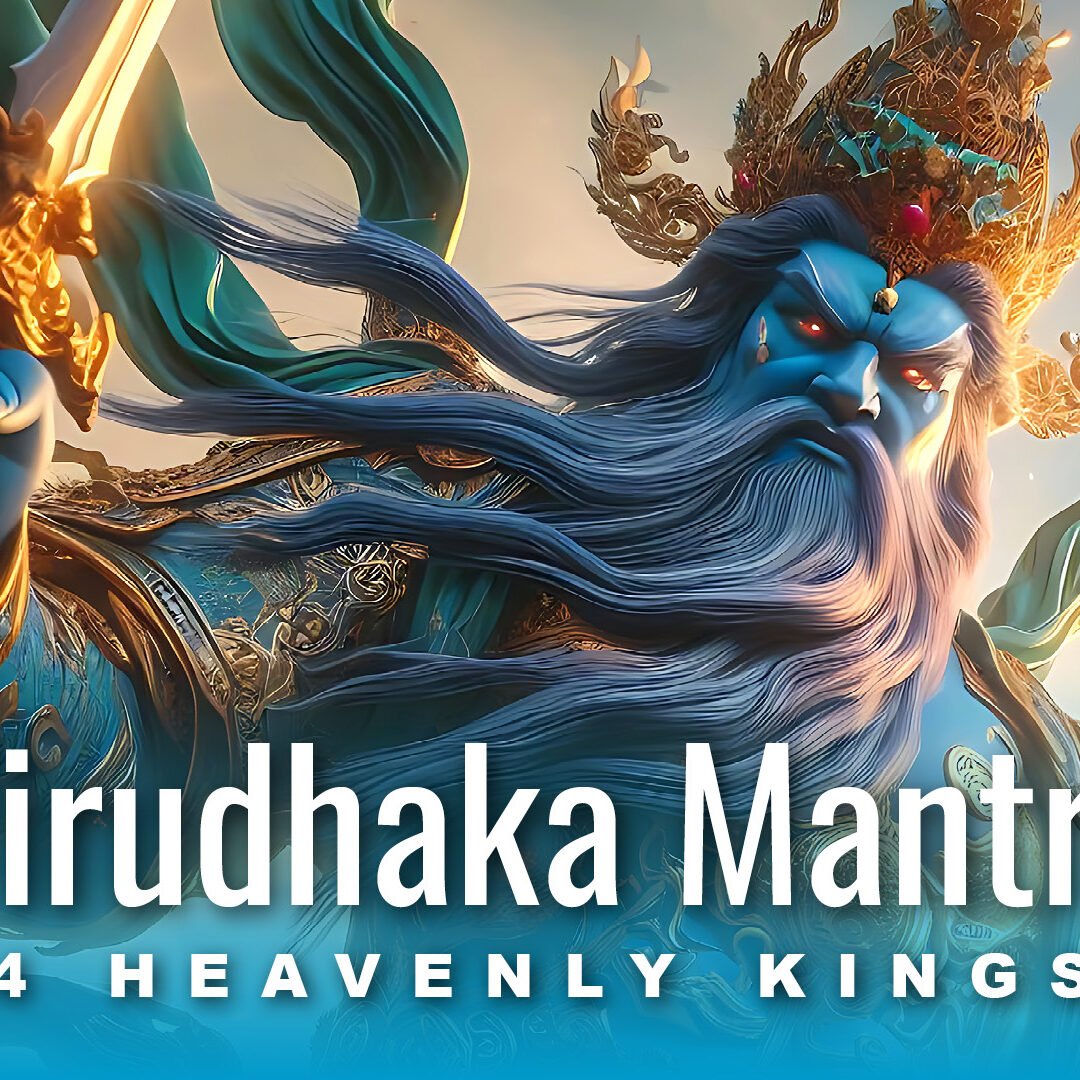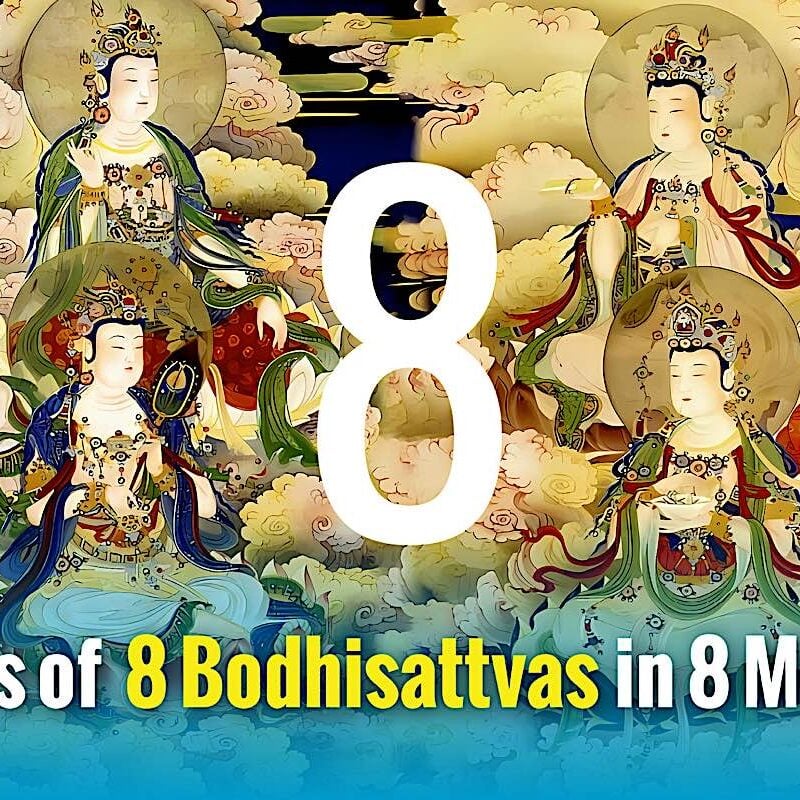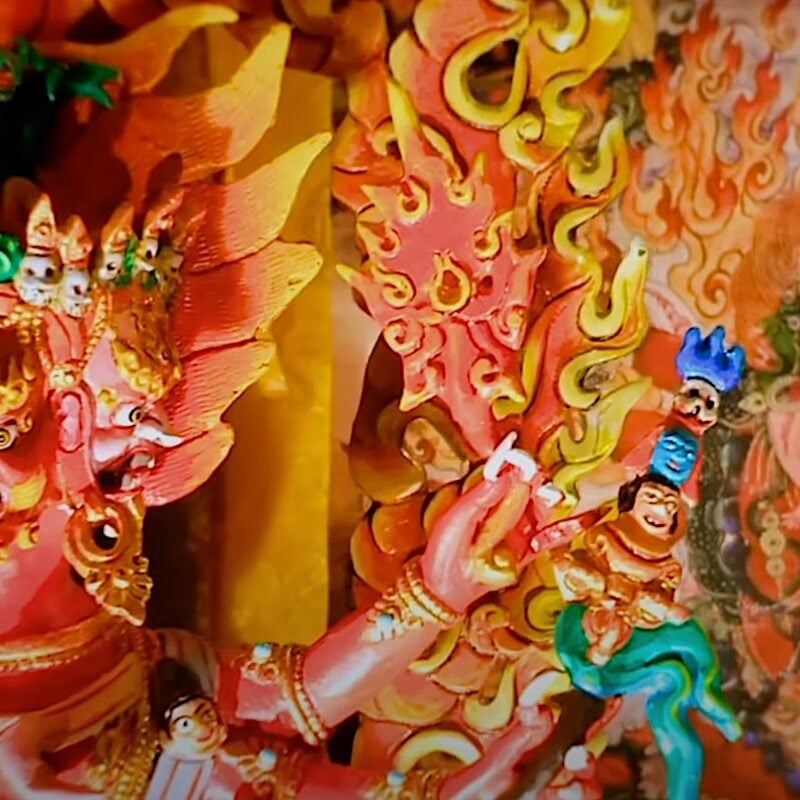Video Mantra: Amoghasiddhi Buddha 1 Hour of Sanskrit Mantras All Accomplishments and Success

Amoghasiddhi’s mantra and practice “accomplishes” all activities with success. Like his co-equal Wisdom consort Tara, he represents Karma and wind (Chi) in our lives and is the manifestation of all activities in our world.
His heart mantra, chanted here, is his praise, name and seed syllable AH (the seed syllable of the Karma family):
Om Amoghasiddhi Ah Hum
Video:
(For a full video documentary on the great Activity Buddha, see: https://www.youtube.com/watch?v=Uz2Mom7Pcqk&t )
Amoghasiddhi Buddha’s name literally means “Infallible Success and Accomplishments.”
Found In the north of the Buddha mandala, the Karma Family of Amoghasiddhi, is green in color — representing life and nature and the pristine green of nature. The Karma family are the “Activity of All the Buddhas of All Times”.
MUSIC AVAILABLE FOR STREAMING in Buddha Weekly’s mini album (5 songs) called Five Buddhas Sanskrit Mantras: Spotify, Apple Music, iTunes, Instagram/Facebook, TikTok & other ByteDance stores, YouTube Music, Amazon, Pandora, Deezer, Tidal, iHeartRadio, Claro Música, Saavn, Boomplay, Anghami, NetEase, Tencent, Qobuz, Joox, Kuack Media, Adaptr, Flo, MediaNet
Spotify: https://open.spotify.com/album/3fUxUuJ6iBAHFMb0S35uGl
APPLE MUSIC: https://music.apple.com/us/album/five-buddhas-sanskrit-mantras-ep/1750003143
Khenchen Thrangu Rinpoche describes it this way:
“All-accomplishing action is the completion of all that needs to be done. Positive passion is their power and what destroys negativity. It is the opposite of jealousy and paranoia.”
Jealousy and envy are the cause of nearly every other poison. Envy is the cause of wars on neighbors, whether it’s a battle over backyard fencing between literal neighbors, or between neighboring countries at war.
Envy makes us angry when we can’t have what we think we want. Envy leads to attachment and clinging to our perceived treasures. Envy and jealousy is the antagonist of love and trust. Greed arises from envying what others have.
Amoghasiddhi’s fearless All-Accomplishing Wisdom overcomes this poison before it degenerates into even more potent poisons like anger and hate. It is only possible through the cultivation of fearlessness.
His color is green, the color associated with nature and our samsaric world and the breath of life, or wind. When we think of living things, we think of green for growth and activity.
Not all of the members of his family are green, although many are, such as Tara, Vishvapani Bodhisattva, Green Karma Dakini, Green Jambhala, Green Vasudhara, and many others.
The wrathful heruka of the family is Karma Heruka Vajrakilaya, who is blue and his Co-Equal consort Diptachakra who is turquoise blue-green.
In a teaching on Vajrakilaya, Garchen Rinpoche elaborated on Vajrakilaya’s purpose as Karma Heruka:
“Amoghasiddhi, lord of the Karma family… is the chief of this mandala. Among body, speech, mind, attributes, and activities, the accomplishment of enlightened activities is the Vajrakilaya Karma heruka’s principal purpose.”
We dedicate the merit of this mantra performance and presentation to the benefit of all sentient beings.
#Amoghasiddhi #sanskritmantra #buddhistmantra #buddhamantra
More articles by this author
Search
Latest Features
Please support the "Spread the Dharma" mission as one of our heroic Dharma Supporting Members, or with a one-time donation.
Please Help Support the “Spread the Dharma” Mission!

Be a part of the noble mission as a supporting member or a patron, or a volunteer contributor of content.
The power of Dharma to help sentient beings, in part, lies in ensuring access to Buddha’s precious Dharma — the mission of Buddha Weekly. We can’t do it without you!
A non-profit association since 2007, Buddha Weekly published many feature articles, videos, and, podcasts. Please consider supporting the mission to preserve and “Spread the Dharma." Your support as either a patron or a supporting member helps defray the high costs of producing quality Dharma content. Thank you! Learn more here, or become one of our super karma heroes on Patreon.
Lee Kane
Author | Buddha Weekly
Lee Kane is the editor of Buddha Weekly, since 2007. His main focuses as a writer are mindfulness techniques, meditation, Dharma and Sutra commentaries, Buddhist practices, international perspectives and traditions, Vajrayana, Mahayana, Zen. He also covers various events.
Lee also contributes as a writer to various other online magazines and blogs.


















